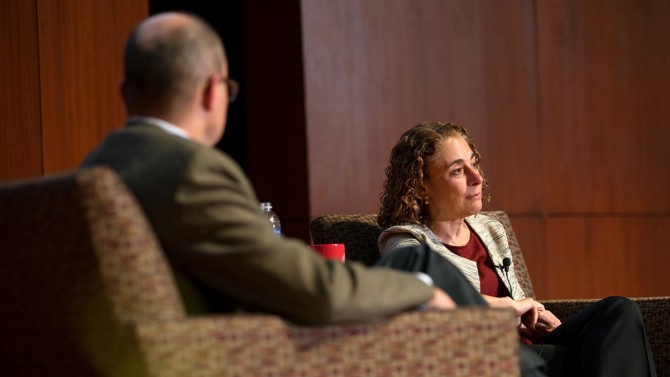Health care system is broken but fixable, physician-journalist says
By Stephen D'Angelo
Across the United States, the fierce debate over how to manage the skyrocketing costs of health care is raging among elected officials at odds over legislative solutions. But the American people know one thing, said Dr. Elizabeth Rosenthal, editor-in-chief of Kaiser Health News: No matter what kind of coverage they have, the price is too high, and the system is broken.
Rosenthal examined the current state of U.S. medical care in her presentation, “An American Sickness: How Health Care Became Big Business and How You Can Take It Back,” to a capacity crowd at Call Auditorium Oct 30.
Asserting that the medical industry is in the business of money-making, not of healing, Rosenthal said the public needs to become educated about how the health care system arrived at this point before meaningful change can be made.
“Our health care system, which used to be in my time or my father’s time focused on caring, on patients, on that interaction with the doctor, on healing, had kind of been hijacked by business practices and business interests,” she said. “That doesn’t mean that there can’t be any profit in health care. But it does mean that the metrics of business – efficiency, return on investment, revenue generation – are generally not a good way to drive a health care system.”
A recent Kaiser Family survey found that even among people with insurance, more than 20 percent had trouble paying their medical bills. Medical bills at large are the No. 1 cause of bankruptcy in the United States. That’s unacceptable, she said.
A Harvard-trained physician, Rosenthal completed her residency at The New York Hospital-Cornell Medical Center and practiced at New York Hospital prior to leaving the field to begin her career in journalism. She joined Kaiser Health News in 2016 after 22 years as a correspondent at The New York Times.
Using cases from her new book, “An American Sickness: How Healthcare Became Big Business and How You Can Take It Back,” Rosenthal told the audience stories of routine office visits billed at hundreds of dollars and surprise “out-of-network” costs for tests patients are told are necessary.
Rosenthal argued the prime driver is no longer what is best for the patient, but what is best for revenue. As an example, she pointed to a researcher who is investigating a cure for Type 1 diabetes, a $20 billion industry.
“She went to the people we conventionally count on to fund medical research, which in this case would be pharma and the companies that make insulin, as well as some of the big foundations who said, ‘Wow, this is really interesting, but you know, if this works, you’ve ruined our business. Why would we pay for this?’” Rosenthal said. “She is now crowdsourcing that research, the trials are ongoing, but what does it say if we have to crowdsource trials for cures?”
Rosenthal discussed several steps that patients can take to avoid unnecessary financial burdens. For example, when getting blood tests done, request doctors not send them to hospital labs that are the highest-priced but to more reasonably priced labs. She also encourages consumers to pay more attention to their bills – and when they are charged for out-of-network providers at in-network hospitals, fight them through insurance companies as well as state laws.
While the national debate is going nowhere, she said, there are hopeful legislative changes occurring at the state level. Rosenthal pointed to Maryland’s new law requiring drug makers to justify certain price increases in prescription drugs as well as a similar bill in California; these are small steps toward putting patients first, she said.
“We have to start taking these little steps so we can start taking those big steps,” she said. “We need a whole lot more transparency so we know what we’re paying. We need a whole lot more price consistency for treatments.”
The lecture was supported by a gift from Jennifer Koen-Horowitz ’93 and Mark Horowitz and co-sponsored by the Department of Policy Analysis and Management and the Cornell Institute for Public Affairs.
Stephen D’Angelo is assistant director of communications at the College of Human Ecology.
Media Contact
Get Cornell news delivered right to your inbox.
Subscribe